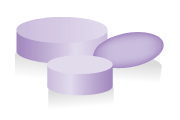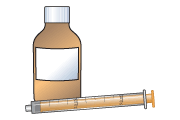Levothyroxine for hypothyroidism
This leaflet is for parents and carers about how to use this medicine in children. Our information may differ from that provided by the manufacturers, because their information usually relates to adults. Read this leaflet carefully. Keep it somewhere safe so that you can read it again.
Name of medicine
Levothyroxine sodium
Brand names: Eltroxin®
This leaflet is about the use of levothyroxine for hypothyroidism (underactive thyroid gland).
Why is it important for my child to take levothyroxine?
Hypothyroidism means that the thyroid gland is not active enough and does not make enough thyroid hormone. Thyroid hormone helps to control energy levels and growth. Levothyroxine is used to replace the missing thyroid hormone.
What is levothyroxine available as?
Tablets: 25 micrograms, 50 micrograms, 100 micrograms; these may contain lactose and sucrose
Liquid medicine: 25, 50 or 100 micrograms in 5 mL
When should I give levothyroxine
Levothyroxine is usually given once each day. This is usually in the morning before breakfast but you can choose another time if this is more convenient.
Give the medicine at about the same time each day so that this becomes part of your child’s daily routine, which will help you to remember.
How much should I give?
Your doctor will work out the amount of levothyroxine (the dose) that is right for your child. The dose will be shown on the medicine label.
Your doctor may suggest that your child has a low dose to start with. They may then change the dose depending on the results of your child’s regular blood tests. It is important to check the medicine label each time you visit the pharmacy.
It is important that you follow your doctor’s instructions about how much to give.
How should I give levothyroxine?

Tablets
- Tablets should be swallowed with a glass of water, squash or juice. Your child should not chew the tablet.

Liquid medicine
- Shake the medicine well.
- Measure out the right amount using an oral syringe or a medicine spoon. You can get these from your pharmacist. Do not use a kitchen teaspoon as it will not give the right amount.
When should the medicine start working?
The medicine will start working straight away but it may be several weeks before your child’s symptoms start to improve. However, you may not see much difference in your child if they didn’t have any obvious symptoms of hypothyroidism.
What if my child is sick (vomits)?
- If your child is sick less than 30 minutes after having a dose of levothyroxine, give them the same dose again.
- If your child is sick more than 30 minutes after having a dose of levothyroxine, do not give them another dose. Wait until the next normal dose.
If your child is sick again, seek advice from your family doctor, nurse, pharmacist, or hospital. They will decide what to do based on your child’s condition and the specific medicine involved.
What if I forget to give it?
Give the missed dose when you remember during the day, as long as this is at least 12 hours before the next dose of levothyroxine is due.
You do not need to wake up a sleeping child to give a missed dose.
What if I give too much?
You are unlikely to cause harm if you give an extra dose of levothyroxine by mistake. If you are concerned that you may have given too much, contact your doctor or local NHS services (details at end of leaflet). Have the medicine or packaging with you if you telephone for advice.
Are there any possible side effects?
We use medicines to make our children better, but sometimes they have other effects that we don’t want (side-effects). Your child is unlikely to get side-effects if the dose of levothyroxine is right.
Side effects you must do something about
If your child gets diarrhoea, vomiting (being sick), tremor, has difficulty sleeping or loses weight, the dose of levothyroxine may be too high. Contact your doctor straight away if your child develops any of these symptoms.
If your child develops a rash or becomes itchy within 14 days of starting levothyroxine, they may be allergic to the medicine. Contact your doctor straight away.
If your child has chest pain or a fast heart beat (they may say that their heart feels fluttery or is racing), contact your doctor straight away or take your child to hospital.
Your child may sometimes get side-effects that are not listed above. Contact your doctor if you notice anything unusual or are concerned. You can report suspected side-effects to www.mhra.gov.uk/yellowcard.
Can other medicines be given at the same time as levothyroxine?
- You can give your child medicines that contain paracetamol or ibuprofen, unless your doctor has told you not to.
levothyroxine should not be taken with some medicines that you get on prescription. It is important to tell your doctor and pharmacist about any other medicines your child is taking before starting levothyroxine.
Calcium or iron supplements should not be given at the same time as levothyroxine, as this may affect how well the medicine works. Calcium and levothyroxine doses should be separated by 4 hours, iron and levothyroxine by 2 hours.
Check with your doctor or pharmacist before giving any other medicines to your child. This includes herbal and complementary medicines.
Is there anything else I need to know about this medicine?
Your doctor will do regular blood tests to measure the levels of thyroid hormone, to make sure that your child is on the right dose of levothyroxine.
Levothyroxine liquid medicine expires 8 weeks after opening.
General advice about medicines
- Try to give medicines at about the same times each day, to help you remember.
- Only give this medicine to your child. Never give it to anyone else, even if their condition appears to be the same, as this could do harm.
- If you think someone else may have taken the medicine by accident, contact your doctor or NHS local services (details at end of leaflet) for advice.
- Make sure that you always have enough medicine. Order a new prescription at least 2 weeks before you will run out.
- Make sure that the medicines you have at home have not reached the ‘use by’ date on the packaging. Give old medicines to your pharmacist to dispose of.
Where should I keep this medicine?
- Keep the medicine in a cupboard, away from heat and direct sunlight.
- It does not need to be kept in the fridge.
- Make sure that children cannot see or reach the medicine.
- Keep the medicine in the container it came in.
Who to contact for more information?
Your doctor, pharmacist or specialist nurse will be able to give you more information about levothyroxine and about other medicines used to treat hypothyroidism.
England: NHS 111
Tel 111
www.nhs.ukScotland: NHS 24
Tel 111
www.nhs24.scotNorthern Ireland: NI Direct
Wales: NHS 111 Wales
Tel 111
www.111.wales.nhs.ukBritish Society for Paediatric Endocrinology and Diabetes
01454 642258
www.bsped.org.uk/Copyright disclaimer
Version [2]. © NPPG, RCPCH and WellChild, all rights reserved. Review by August 2018.
The primary source for the information in this leaflet is the British National Formulary for Children. For details on any other sources used for this leaflet, please contact us through our website, www.medicinesforchildren.org.uk.
We take great care to make sure that the information in this leaflet is correct and up-to-date. However, medicines can be used in different ways for different patients. It is important that you ask the advice of your doctor or pharmacist if you are not sure about something. This leaflet is about the use of these medicines in the UK, and may not apply to other countries. The Royal College of Paediatrics and Child Health (RCPCH), the Neonatal and Paediatric Pharmacists Group (NPPG), WellChild and the contributors and editors cannot be held responsible for the accuracy of information, omissions of information, or any actions that may be taken as a consequence of reading this leaflet.
